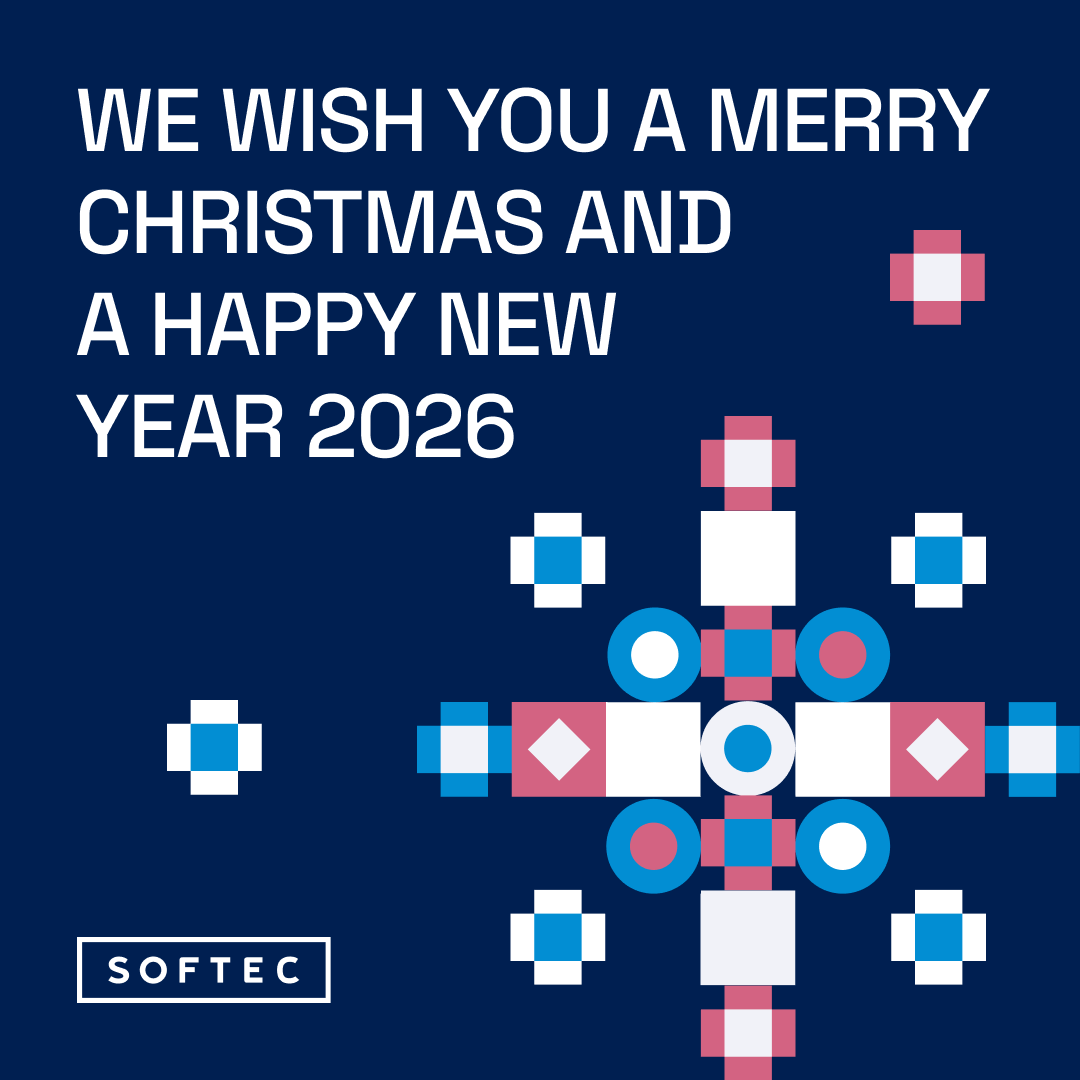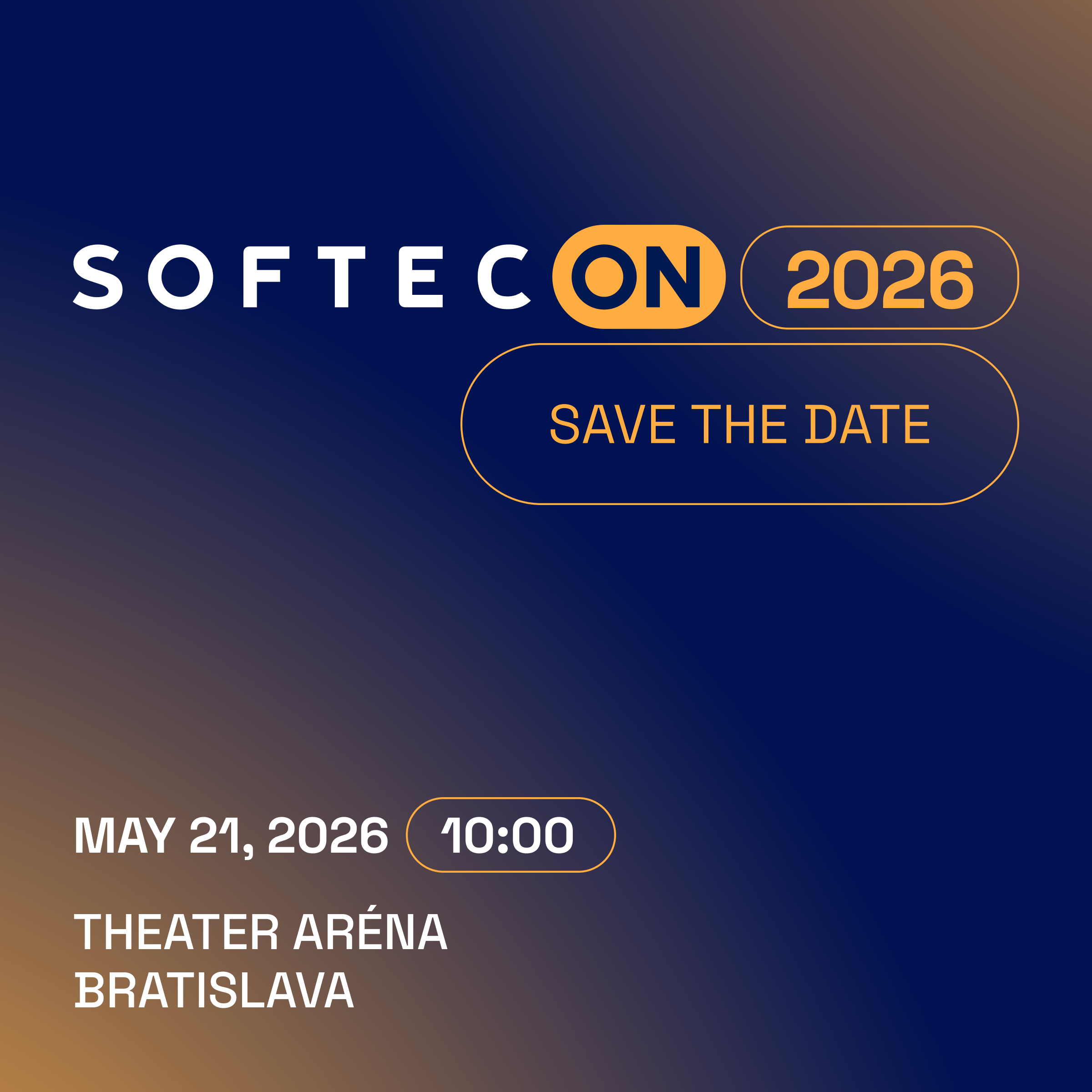
News12. December 2025
PF 2026
WE WISH YOU A MERRY CHRISTMAS AND A HAPPY NEW YEAR 2026
Softecon10 May 2022

Watch the recording from the 19th year of the professional conference on current trends and visions in the field of information technologies and their impacts on business and society - SOFTECON 2022. We carefully choose topics and select lecturers so that every year we bring a new perspective on current trends in the world of IT and business and share inspiring stories from business, research and scientific spheres. The main theme of this year was Digitalization as an automation tool. Many processes around us are now digital, remote operators have experienced massive development, and bank branches are now teeming with modern technologies, tablets and electronic signatures. So why does operation still take a long time and is complicated and expensive? Is there a flaw in the processes or in the technology?
#softec #softecon #innovation #digitalization
14:00 - Opening of the conference
14:05 - Libor David: Key Note - Native Digitalization – Evolution or Revolution?
14:20 - Libor David, Kristýna Dudková, Peter Belica: Native digitization
14:45 - Boril Šopov: Image data mining in financial institutions
15:05 - Vladimir Simunović: The Way to Cloud
15:25 - Break
15:40 - Ondrej Svačina: Modern IoT and AI technologies in public administration services
16:00 - Jakub Šimko: How to supervise the spread of disinformation by social media recommendation algorithms?
16:20 - Martin Plesch, Daniel Nagaj, Samuel Kováčik: The near future of quantum computers
17:05 - Networking
Presenters: Martin Petriščák, Andrej Žlnka a Samuel Kováčik

Libor graduated from the Faculty of Electrical Engineering of the Czech Technical University in Prague and has been cooperating with SOFTEC since 2021 as a Digital Architect. Previously, he worked in Accenture's consulting division, from his beginnings to leading financial services in the region. He has participated in a number of digital transformations of major financial institutions in Central Europe, either as a consultant or an employee of the institution, and has also gained experience on projects in the USA. He also acts as a mentor to promising start-ups and cooperates with innovative start-up accelerators.
Many processes around us are now digital, what new can we bring and why do we dare to talk about it as a revolution? Remote operators have seen massive development and we consider the resulting disruptors to be the pinnacle of innovation. Branches and contact points have long used classic processes with pencil and paper, but even there it is now teeming with modern technology, tablets and electronic signatures. So why is it still long to operate and complicated and expensive? Why can't we discuss our needs with the banker in plain human language, simply, comprehensibly, and shake hands at the end? And is there a mistake in the processes or in the technology, are we technologically equipped to change?

Libor graduated from the Faculty of Electrical Engineering of the Czech Technical University in Prague and has been cooperating with SOFTEC since 2021 as a Digital Architect. Previously, he worked in Accenture's consulting division, from his beginnings to leading financial services in the region. He has participated in a number of digital transformations of major financial institutions in Central Europe, either as a consultant or an employee of the institution, and has also gained experience on projects in the USA. He also acts as a mentor to promising start-ups and cooperates with innovative start-up accelerators.
Kristýna is a senior regulatory expert in the Financial Services Consulting team at Ernst & Young, where he focuses on legal and regulatory issues of the financial sector, especially in the areas of consumer credit, digitization, payment services, anti-money laundering protection, insurance, etc. Kristýna holds a master's degree from the Faculty of Law of Charles University in Prague.
Peter works at SOFTEC as an architect of native digital solutions in the NFINITY team (https://www.nfinity.digital). In the past, he has gone through various roles from developer, through team leader and consultant on major projects for financial institutions such as banks, insurance companies and brokerage groups. Thanks to this combination of different roles and financial institutions, it is a strong reinforcement in implementing the principles of digital contracting with our customers.
Many processes around us are now digital, what new can we bring and why do we dare to talk about it as a revolution? Remote operators have seen massive development and we consider the resulting disruptors to be the pinnacle of innovation. Branches and contact points have long used classic processes with pencil and paper, but even there it is now teeming with modern technology, tablets and electronic signatures. So why is it still long to operate and complicated and expensive? Why can't we discuss our needs with the banker in plain human language, simply, comprehensibly, and shake hands at the end? And is there a mistake in the processes or in the technology, are we technologically equipped to change?

Founder of Searpent, an insurance fraud detection startup. Previously, he worked for ČSOB Bank and Deutsche Boerse. He holds a PhDr. in Economics from Charles University, an LL.M. in Business Law from Masaryk University and a Master's degree in Risk Management from the Duisenberg School of Finance (VU Amsterdam).
Artificial intelligence and machine learning have been on the rise in financial institutions recently. The most common use cases focus on structured data. We will talk about the challenges and benefits of using image data to improve customer experience as well as reduce costs through automation or fraud prevention.

Vladimir is a senior international executive with 20+ years of successful organization and technology leadership. He is the man behind RBI’s Cloud strategy and transformation. A Cloud Evangelist promoting startup mentality, out-of-box thinking, customer values and benefits of Cloud adoption, he sees his role as an agile change-agent, enabling intra-company cultural and mind-set transformation. He currently serves as Head of IT of RPC. Vladimir is married and father of two teenage girls. His lecture will be in English.
Motivations and practical challenges behind the Cloud transformation in the Raiffeisen Bank International Group. The speaker will share how he launched and scaled Raiffeisen Cloud Center of Excellence, with a “Cloud First” approach in designing and building Infrastructure and Applications. The journey will be illustrated by practical topics such as developing new Cloud product and pricing models, cost optimization and management and Cloud governance. Furthermore, experience from the ongoing Cloud transformation in Bratislava based RPC (Card payments processing subsidiary of RBI) will be discussed.

Ondrej graduated from the Faculty of Mathematics, Physics and Informatics of Comenius University in Bratislava. During his working career, he held various positions in the field of analysis and development of complex information systems. Currently, he is in charge of development, consulting and trade in the field of transport and environment at SOFTEC and specifically for modern technologies such as the Internet of Things (IoT) and artificial intelligence.
Keeping roads passable during the winter months is a logistically and cost-intensive activity whose success depends heavily on the vagaries of the weather. We cannot tame the weather, but by applying modern Internet of Things (IoT) and machine learning technologies, we can monitor the current and also predict the future condition of the road surface, which allows winter maintenance to be carried out at the right time and in the right place. Let's take a look at an example of how solutions based on modern technologies open up opportunities for better, more cost-effective and greener provision of public administration services.

He graduated from the Faculty of Informatics and Information Technologies STU in Bratislava. Jakub focuses on the intersection of human computation, machine learning and user modelling. Since 2020, he has been working as an Expert Researcher at the Kempelen Institute of Intelligent Technologies.
Social media's recommendation algorithms greatly exacerbate the problem of spreading disinformation. This is – originally unintended – a consequence of their preference for attractive, emotional or polarizing content. How did we get into this state of disinformation bubbles? Is it possible to "crack" them? How do large platform operators respond? Are they willing to voluntarily remove this feature of their algorithms? What will the forthcoming regulation bring us?

Martin studied at FMPI Comenius University in Bratislava and at the University of Innsbruck and defended his doctorate at the Institute of Physics of the Slovak Academy of Sciences. In addition to Slovakia, he worked at the universities of Vienna, Brno and Oxford. He is currently working on the possibilities of quantum cryptography on imperfect devices and testing the possible use of existing quantum computers. He is dedicated to youth as president of the International Tournament of Young Physicists.
Daniel studied theoretical physics at FMPI Comenius University in Bratislava and received his doctorate at MIT in the USA. After years abroad, he returned and has been engaged in research at the Institute of Physics of the Slovak Academy of Sciences in Bratislava for a long time. He thinks about what nature will allow us to calculate – but also about what will not be able to be calculated efficiently even on computers that we do not yet have.
Samuel studied theoretical physics at FMPI Comenius University in Bratislava, where he also obtained his doctorate. He then spent several years at Dublin's Institute of Advanced Studies. His research focuses on the structure of space and the effects of quantum gravity. He founded the Vedator project, through which he popularizes science in Slovakia.
Classical computers changed the world in the last century. Today, however, we hear about the quantum revolution necessary for their further development. These new technologies are based on non-intuitive principles of quantum physics, such as superposition and entanglement. In the discussion we will explain how to think about them. We will show where we see the most powerful applications of quantum computing in practice: in secure communications, simulations, new approaches to optimization and precision sensors. Finally, we will look at the challenges that need to be overcome in order for quantum computers to be widely implemented—bug fixing, difficult scaling, and the need for new algorithms.
News

News12. December 2025
WE WISH YOU A MERRY CHRISTMAS AND A HAPPY NEW YEAR 2026

Softecon12. December 2025
For 22 years, SOFTECON has been the trusted platform where business meets technology. Last year’s edition welcomed more than 300 leaders and experts from top companies across the region.
The next conference will take place on 21 May 2026 at Divadlo Aréna in Bratislava. Expect real-world stories from leading Central European companies advancing their business through technology and artificial intelligence.
Please reserve the date. More details will follow soon.

News1. October 2025
Technology company SOFTEC has announced the expansion of its management team with the appointment of Alexander Brabetz, an experienced executive with an extensive background in digital solutions and enterprise transformation. His arrival is part of SOFTEC strategy to strengthen its presence in the Austrian market, where the company has long-term relationships with clients such as Vienna Insurance Group and Raiffeisen Bank International.

News5. August 2025
How are the leading players in the Czech insurance market responding to changing customer needs, technological trends, and regulatory requirements? The latest SOFTEC study maps the level of digitalization across key areas such as sales and customer service, cooperation with partners, and internal operations. Find out which factors contribute to success, what the main obstacles are, and how insurers are adapting to new challenges.